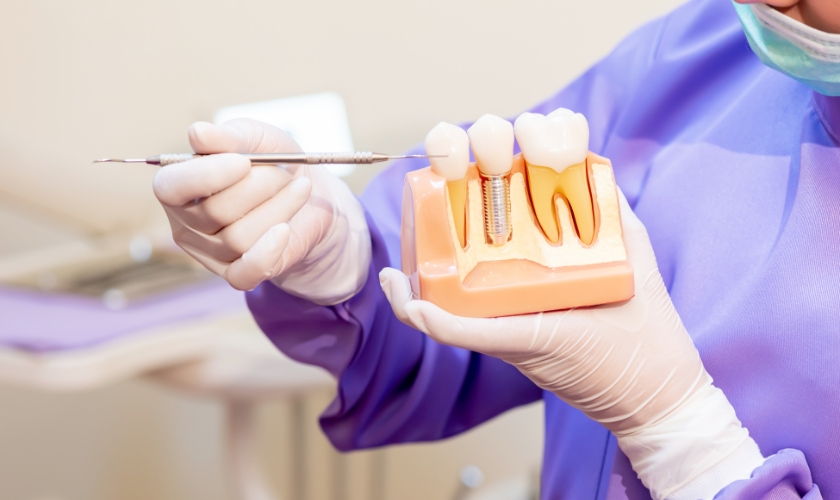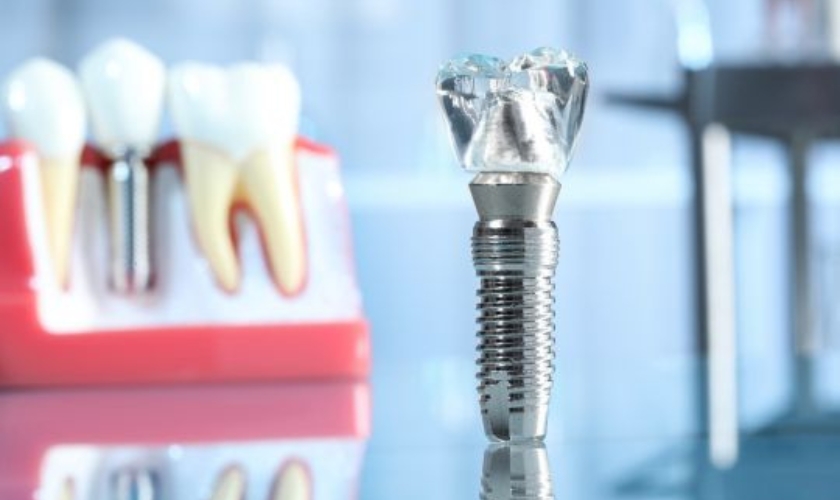
Dental implant surgery is a life-changing procedure that can restore your smile and improve your oral health. However, proper preparation is essential to ensure a successful outcome. In this guide, we’ll walk you through everything you need to know to prepare for dental implant surgery in Dallas, TX, from initial consultation to post-operative care.
Understanding Dental Implant Surgery
Dental implant surgery offers a permanent solution for replacing missing teeth. It’s a multi-stage process that requires careful planning and execution to ensure successful integration of the implant with your jawbone and long-term functionality.
The Core Concept: Mimicking Natural Tooth Roots
Unlike dentures or bridges that rest on top of the gums, dental implants are designed to function much like natural teeth. They consist of small, screw-like posts made of biocompatible titanium. These posts are surgically placed within the jawbone, acting as artificial tooth roots. Over time, the jawbone fuses with the implant surface in a process called osseointegration, creating a strong and stable foundation.
Preparing for Your Consultation
The first step in preparing for dental implant surgery in Dallas is to schedule a consultation with your Dallas dentist or oral surgeon. During this visit, your dentist in Dallas, TX will evaluate your oral health, take X-rays, and discuss your treatment options. Be sure to ask any questions you have about the procedure and share any concerns you may have.
Medical Evaluation and Dental X-Rays
Before undergoing dental implant surgery, your dentist in Dallas will conduct a thorough medical evaluation to ensure that you are a suitable candidate for the procedure. This may include reviewing your medical history and performing a physical examination. Additionally, dental X-rays will be taken to assess the condition of your jawbone and determine the best placement for the implants.
Developing a Treatment Plan
Based on the results of your consultation and evaluation, your dentist near Dallas will develop a personalized treatment plan for your dental implant surgery in Dallas, TX. This plan will outline the number of implants you will receive, the type of anesthesia that will be used, and the overall timeline for your treatment.
Preparing for Surgery
Undergoing dental implant surgery is a significant step towards a renewed smile and improved oral health. To ensure a smooth and successful procedure, here’s a comprehensive guide to help you prepare in the days leading up to your surgery:
Pre-operative Instructions
Consultation Clarity: Meet with your Dallas dentist or oral surgeon for a thorough consultation. Discuss any concerns you have and ensure you understand the entire procedure, including the number of implants being placed, the type of anesthesia used, and the recovery timeline.
Medical History Disclosure: Provide a complete medical history, including any medications you’re currently taking, allergies, and previous surgeries. This helps your dentist assess any potential risks and adjust the surgery plan accordingly.
Fasting for Surgery: Follow your dentist’s specific instructions regarding food and drink restrictions before surgery. Typically, for general anesthesia, you’ll need to avoid eating or drinking anything (including water) for 8-12 hours beforehand. This minimizes the risk of nausea and aspiration during surgery.
Consultation Clarity: Meet with your Dallas dentist or oral surgeon for a thorough consultation. Discuss any concerns you have and ensure you understand the entire procedure, including the number of implants being placed, the type of anesthesia used, and the recovery timeline.
Medical History Disclosure: Provide a complete medical history, including any medications you’re currently taking, allergies, and previous surgeries. This helps your dentist in Dallas, TX assess any potential risks and adjust the surgery plan accordingly.
Fasting for Surgery: Follow your dentist’s specific instructions regarding food and drink restrictions before surgery. Typically, for general anesthesia, you’ll need to avoid eating or drinking anything (including water) for 8-12 hours beforehand. This minimizes the risk of nausea and aspiration during surgery.
Comfortable Clothing
Loose-fitting Attire: On the day of surgery, wear loose, comfortable clothing that won’t restrict your movement, especially around your neck and arms. Avoid tight collars or button-down shirts that might irritate your incision sites.
Easy-to-Remove Shoes: Opt for comfortable shoes that are easy to slip on and off, as you might experience some swelling after surgery.
The Day of Surgery
Plan to arrive at the dental office early to complete any necessary paperwork and relax in the waiting area. Your dentist will discuss your anesthesia options beforehand. This could include local anesthesia (numbing the area), sedation dentistry (relaxed but conscious), or general anesthesia (completely asleep). Depending on your chosen anesthesia, you may be prescribed antibiotics to prevent infection or medication to help you relax.
The dental team will prepare the surgical area by sterilizing it and draping your mouth with a surgical cloth. Using local anesthesia or sedation, the dentist will make an incision in the gum tissue to expose the jawbone. Precise drills will create small holes in the implants. The implants, typically screw-like posts, are then inserted into the jawbone. Stitches may be used to close the gum tissue around the implant site(s).
Post-Operative Care
Following your dental implant surgery, proper care is crucial for optimal healing and long-term success of the implants. Here’s a detailed breakdown to guide you through the recovery process:
Immediately Following Surgery
Pain Management: Your dentist will likely prescribe pain medication to manage any discomfort after surgery. Take medications exactly as prescribed, and don’t hesitate to contact your dentist if the pain worsens.
Bleeding: Minor bleeding is expected after surgery. Apply gentle pressure with a gauze pad to the surgical site for 10-15 minutes to control it. Avoid rinsing or spitting vigorously for the first 24 hours.
Swelling: Swelling around the surgical site is common. Apply a cold compress to the outside of your cheek for 15-minute intervals with breaks in between to reduce swelling.
Diet
First 24 Hours: Stick to a soft diet consisting of lukewarm liquids and pureed foods. Avoid hot or spicy foods, as they can irritate the surgical site.
Following Days: Gradually introduce soft, easy-to-chew foods like yogurt, mashed potatoes, and scrambled eggs. Avoid hard, crunchy, or sticky foods that can put pressure on the implant site.
Long-Term: Once fully healed, you can resume your regular diet. However, be mindful of very hard foods like nuts or candy that could damage the implant.
Oral Hygiene
Brushing: The day after surgery, you can gently brush your teeth, avoiding the implant site. Use a soft-bristled toothbrush and gentle toothpaste.
Flossing: For the first week, avoid flossing directly around the implant site. Your dentist may recommend a special flossing tool to clean between teeth.
Mouthwash: Use a mild antiseptic mouthwash as directed by your dentist, especially after meals, to help reduce bacteria and promote healing.
Rest and Recuperation
Your body needs time to heal. Plan to take it easy for the first few days after surgery. Avoid strenuous exercise for at least a week after surgery. Gradually increase your activity level as you feel up to it. Prop yourself up with extra pillows while sleeping to minimize swelling.
Preparing for dental implant surgery requires careful planning and preparation. By following the steps outlined in this guide, you can ensure that you are fully prepared for your procedure and can enjoy the benefits of a beautiful, healthy smile for years to come.


